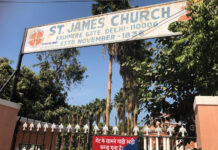By Prof Sehdev Kumar
(This article, which was originally published on August 27, 2012, is being republished to coincide with 99th birth anniversary of the poetess on August 31, 2018)
TORONTO: The month of August is filled with many festivities: Rakhi, Krishna Ashtami, Eid, and the independence of India and Pakistan. But it should also be remembered for one of the great Punjabi poets and writers: Amrita Pritam. She was born on August 31, 1919, in the village of Gujranwala, now in Pakistan. The legend has it that Heer of the great love story, Heer and Ranjha, was born here. The great story has been immortalized by the legendary Punjabi Sufi poet Waris Shah.
August is also the month where the great nation of India was divided, leaving relentless blood and ferocious mayhem on both sides of the divide, pitting communities and neighbours against each other, spewing vitriolic hatred against one another.
It was then that Amrita Pritam beseeched, with disarming eloquence, the great poet Waris Shah to speak of love yet once again:
Ajj aakhan Waris Shah noon
kiton kabraan vichchon bol,
Te ajj kitab-e-ishq daa
koi agla varka phol..
Ik roi si dhi Punjab di
tun likh likh maare vaen,
Ajj lakhaan dhian rondian
tainun Waris Shah nun kehn..
“O Waris Shah, I beseech you to speak from your grave;
And start anew another page in the story of love.
What an epic you had written once
about one weeping daughter of Punjab;
And today thousands of daughters are crying out to you.
Look at the rotting corpses on the fields;
Look at the rivers flowing with blood.
O Waris Shah, I beseech you to speak from your grave.”
In every age, even in the midst of most brutal forces of repression, in the hands of an artist, or in the words of a poet, or in the voice of a singer, time and again human heart aches to reach out to the innocent and the afflicted, to mourn the heedless brutality, to render voice to the voiceless, and to celebrate the triumph of love over hatred.
In her long years as a prolific poet and a writer this is what Amrita Pritam did, touching the hearts and minds of millions everywhere.
If Amrita Pritam is the wailing voice of women who have been ravaged in every war – whether in Germany at the hands of conquering Soviet Army in 1945 or in Bangladesh in 1971 – there are other poets and artists in India who have spoken as an icon of human conscience in defiance of every brutalizing force.
In 1961, when the first elected leader of the Republic of Congo, Patrice Lumumba, was assassinated through imperialist conspiracy, another great Indian poet and lyricist, Sahir Ludhianvi, wrote a poem, “khoon phir khoon hai”. The poem sings – as only great art can – that however fierce the powers of repression, life’s vitality is never drowned; like the Phoenix, it rises again and again from the ambers of its own funeral pyre, and lays new eggs in the burning coals of fire, to celebrate the triumph of life over death:
Khoon phir Khoon hai, so shakl badal sakta hai aisi shaklein ke mitaaoo to mitaaye na bane aise shole k bujhaao to bujhaaye na bane aise naare k dabaao to dabaaye na bane.
“Blood has its mysteries; it flows on.
It changes and transforms,
But is never dries out.
It has fire that can never be extinguished;
It has hidden messages in it
that can never be erased.”
Sahir Ludhinanvi – a close friend and fellow-traveller of Amrita Pritam – became a symbol of pathos, rebellion and hope for millions all across South Asia. His poems, as in Guru Dutt’s famous film Pyassa, have the daring to point an accusatory finger against hypocrisy and harbingers of death. But they also point to the moon, to hope:
Jhine naaz hai Hind par, woh kahan hain,
Kahan hain,
Kahan hain?
“Where are they who sing the glory of this land?
The suffocated breath, the clinking coins,
The jarred doors, the stifled throats;
The hagglers, the pious…”
How impoverished we would be like without the voice of such poets!
(Prof Sehdev Kumar lectures on `International Cinema and Human Condition’ at the University of Toronto. He is author of “the Vision of Kabir”)
READ NEXT: Amrita Sher-Gil’s self-portrait fetches £1.7 million in London auction
READ NEXT: Punjabi spin on Chekhov’s powerhouse play The Orchard at the Shaw Festival









I collect ur article on Amrita, so nice, thanks to all